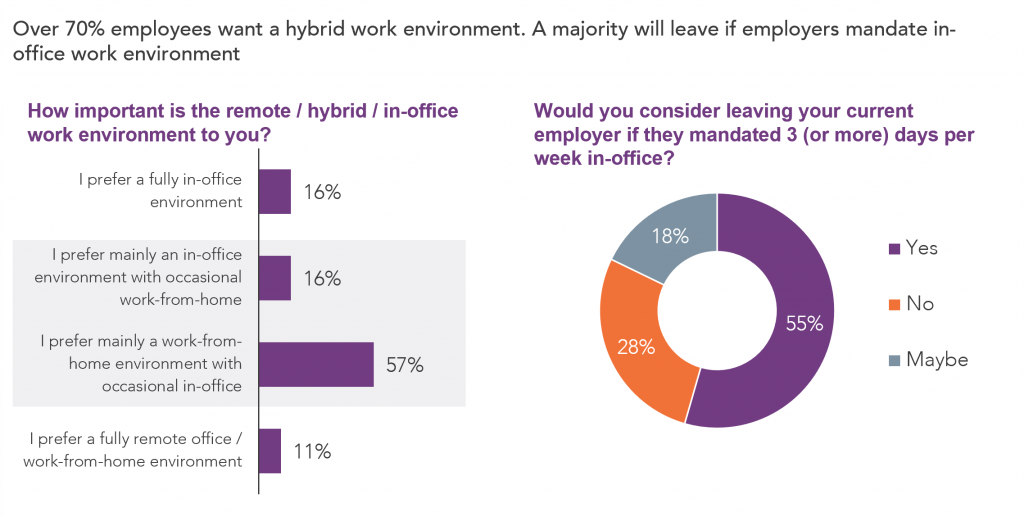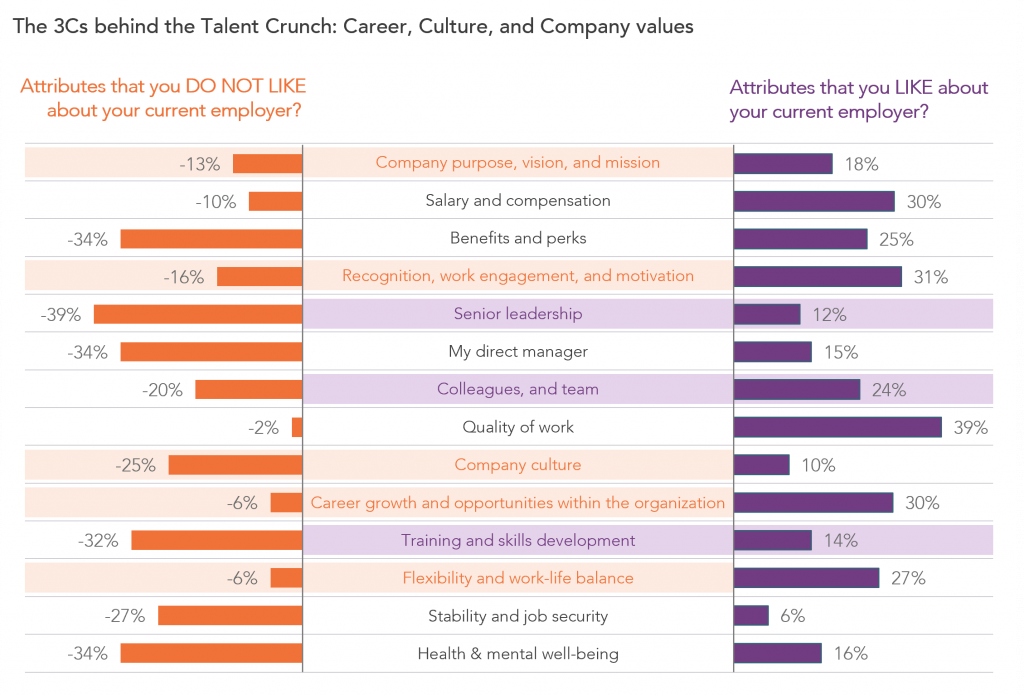To succeed in the war for talent, employers must engage with employees’ desires to shape their own—and their organizations’—authentic futures. The Great Resignation is a fact of life. The pandemic changed work irrevocably, not least because it awakened employees to new possibilities; hybrid and remote working became the stock-in-trade of global business employment practices (Exhibit 1). At HFS, we’re clear that isn’t going to change, despite the desire of some leaders for a return to the world before.
But employees are also bored and, in some cases, miserable. According to the 2022 Gallup State of the Global Workplace survey, nearly a fifth are the latter. Meanwhile, the world is on fire, with climate change, war, and the cost-of-living crisis driving employee anxiety ever higher worldwide. This is both intrinsically bad and a business problem; anxious workers are often unproductive. They’re also likely to vote with their feet. Someone needs to give them a future.
Authentic futures are ones where individuals feel empowered to shape their own destinies within the organization, with a clear sense of possibilities for growth and development according to their interests and skills. Authentic futures are ones where the organization renews its future—and ecosystem—through the diversity of these journeys and the insights that come from them, aligning with shared organizational purpose.
Employees are, as Gallup noted, people, and people care about their futures. “Organizations need to think about the whole person, not just the worker,” the survey’s authors write. And they’re right. The organization can succeed in attracting and retaining talent by being a vehicle for authentic futures in a world where what we have previously taken for granted has gone by the wayside.

Sample: 1,800 employees across leading IT/business service providers
Source: HFS Research, 2022
Ossified bureaucratic norms of traditional management took a fatal hit in the pandemic, as Lynda Gratton notes in her recent Redesigning Work. The innovation that took place in 2020-2021 is what employers should be looking to enrich and develop rather than a return to the preexisting status quo for the sake of it.
The pandemic proved the value of employee experience (EX) as a driver of growth but as the very foundation of organizational survival. A revitalized commitment to EX and the harmonization of EX and consumer experience (CX) through building authentic futures at the individual, organizational, and ecosystem levels can win the war for talent and futureproof organizations, ecosystems, and individuals against challenges to come.
Employees want and need to know they have a future in a world of uncertainty and that their organizations’ visions of their futures align with their own. Back-to-the-office mandates don’t fit with that, whatever the merits of genuine concerns over employee engagement. Staff members aren’t uniform in their wants or expectations, of course, as HFS has shown (Exhibit 2). But thinking about individual futures and retaining and developing talent involves engaging it in designing the future of organizational work practices—even workplaces.

Sample: 1,800 employees across leading IT/business service providers
Source: HFS Research, 2022
Take hybrid. Hybrid working might not mean regular work in physical offices at all. The immediate potential of the metaverse is overblown, but, as Gratton also shows, soon it might not be. Even if employees are to go back to physical workplaces or have already done so, the design of that space need not—should not—remain the same.
Employees care about the world they live in and their own and their families’ futures. Businesses have responsibilities to ESG investors, consumers, and their employees. The authentic future concept can include the organization’s climate strategy, for example, which can be articulated to all stakeholder groups engaged in developing it as an iterative process.
Ditto diversity, equity, and inclusion (DEI). Diversity, equity, and inclusion are good in themselves—and good for business. In a war for talent, cutting yourself off from the whole pool is morally wrong and bad for the bottom line. It’s time to break chief diversity officers and CXOs out of their silos if they’re still stuck in them. If your organization is one with the chief diversity officer speaking at town halls rather than one where DEI is intrinsic to all aspects of the business, it’s time to change.
CX and EX can unify in a future-oriented approach to crises. History happens. COVID-19 wasn’t the first pandemic this millennium; Ukraine won’t be the last conflict to cause immense human suffering and disrupt the world economy. Data breaches will continue to be a fact of life despite the best efforts of cybersecurity firms.
Part of the authentic future will be how organizations respond to crises in a way that builds confidence. HFS analyst Melissa O’Brien has written of Honda’s endeavors to build CX through roadside assist—literally being there for their customers—but the same rules apply to EX and BPO partnerships. She notes that sometimes the most lasting impact is generated in bad times.
And yes, part of building authentic futures is continuing to break down barriers over automation. Organizations working on implementing machine learning (ML) in healthcare have long faced accusations they are threatening clinicians’ jobs; the legacy of the pandemic pivot should be a greater awareness that automation is there to enable workers to do more interesting things, not to eliminate them.
To make this happen, leaders need to be open and unafraid of the possibilities of an authentic hybrid workplace and empowering talent to realize its opportunities.
Register now for immediate access of HFS' research, data and forward looking trends.
Get StartedIf you don't have an account, Register here |
Register now for immediate access of HFS' research, data and forward looking trends.
Get Started